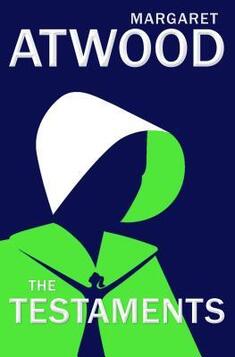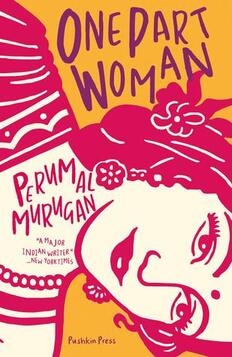The Testaments by Margaret Atwood
As you probably know, it’s a novel about the rise and fall of a misogynist theocracy, told from three points of view. In Aunt Lydia, one of the founders who dictates and manages the systematic abuse of girls and women, Margaret Atwood has created a marvellously engaging villain. And humanised her: she’s done what she felt she had to do to survive. Expect lively discussions about whether, in those dreadful circumstances, we’d behave likewise; I don’t think I could, but I managed to shock my book group when, discussing Dark Water by Elizabeth Lowry, I said I’d willingly eat any of my friends to stay alive. And I’m a vegetarian.
The other two voices are of girls growing up on either side of the North American border. Daisy is a typical Canadian teenager, albeit a little overprotected by her parents – and she’s soon to discover why. Growing up in Gilead, Agnes is also protected by her mother, although her father, Commander Kyle, barely notices her. Life gets tougher when her mother dies and she is prepared for marriage to a powerful man her father’s age whose other young wives have all died mysteriously.
The setup is magnificent, with touches of humour, especially from the outwardly dour Aunt Lydia, and poignancy in the schoolgirls’ ignorance beyond flower arranging and embroidery. I felt Agnes becomes disillusioned too quickly – although she does hang on to her religion, and she is facing legalised rape. Although I enjoyed the resolution, I kept waiting for things to turn even more awful than they were. Most of the tension was in the first half rather than at the end.
A bonus for me was another fictional toilet to add to my collection, bringing the total to 19. In the dawning days of Gilead, when female intellectuals of any stripe are rounded up and held in a stadium, Aunt Lydia quickly cottons on to how inadequate facilities can be weaponised to degrade (p142):
lineups for the foul toilets, and good luck to you if yours was clogged, since no one would come to unclog it. My theory? The guards went around at night stuffing various materials down the toilets as a further aggravation …
Did I say there was no toilet paper? What then? Use your hand, attempt to clean your sullied fingers under the dribble of water that sometimes came out of the taps and sometimes did not. I’m sure they arranged that on purpose also, to raise us up and hurl us down at random intervals. I could picture the glee on the face of whatever kitten-torturing cretin was assigned to this task as he flipped the power switch on the water flow system back and forth.
We had been told not to drink the water from those taps, but some unwisely did. Retching and diarrhoea followed, to contribute to the general joy.
While I enjoyed The Testaments, I don’t think it merits it taking half the Booker prize from Bernadine Evaristo for Girl, Woman, Other. Especially when Margaret Atwood has one all to herself already! But, with a wealth of quality works behind her, she’s certainly due the Nobel Prize.
It’s impossible to read The Testaments without the excellent TV series sitting on one’s shoulder, which might have rendered some of the novel’s scenes less shocking. My reading was also overshadowed by my WIP, Snowflake, about a teenager with a noise phobia, set in a dystopian near future where empathy has disappeared. Although undoubtedly influenced by The Handmaid’s Tale, ditto every other dystopian novel I’ve read, I was interested to find some commonalities with The Testaments which I hadn’t anticipated, but also differences.
In my novel, as in many contemporary Western societies, the genders are officially equal, but powerful men still manage to access women’s bodies without their consent. Told from the point of view of the weakling son of powerful parents, the brutality, masquerading as building strength, begins in the nursery. Will Nelson learn to distinguish truth from falsehood in time to save himself?
One Part Woman by Perumal Murugan translated by Aniruddhan Vasudevan
They consider and reject adoption, make pilgrimages and give offerings, consider and reject Kali taking a second wife. Sometimes they feel desperate; at other times their love seems enough. But without respect for their predicament, they’re isolated, unable to play a part in their communities, as if they’re not fully adult.
There’s one remedy they haven’t yet considered, because neither wants to sacrifice their relationship for a child. But as the festival for the half-male, half-female god Maadhorubaagan approaches the pressure increases: for one night only taboos are lifted and consensual sex between unmarried men and women is allowed.
I was drawn to the theme of this novel: many of those I met in rural India in my mid-twenties were concerned I had neither husband or children, or assumed I was still in my teens. But, although a bestseller in India since its publication in Tamil in 2010, I found myself waiting in vain for the story to take off. Nevertheless, I appreciated the rare opportunity to read a translation from Tamil and one endorsed by the author of Ghachar Ghochar, one of my favourite reads from two years ago. Thanks to Pushkin Press for my review copy.
For another novel about societal pressures exacerbated the pain of infertility, this one set in Nigeria, see Stay With Me by Ayòbámi Adébáyò. My own novel, Underneath, although not about infertility per se, explores a relationship breakdown stemming from different perceptions of the importance of having a child.
| I was in shock when the latest flash fiction challenged pinged into my inbox. Here in the UK, the ‘people’ have elected their pig in a poke . While there’s a nod to One Part Woman in my 99-word story it’s more about my grief, fear and sense of helplessness as we approach The Testaments territory, building our own version of hell on earth. At least my WIP, Snowflake, will remain topical. |
He was hard on the outside, hollow within. Lacquered against the elements, he squatted, with his fishing rod, beside the pond.
People threw in coins, made a wish: for a lottery win, a baby, a cruise. Fixed smile above his beard, his belted tunic, above his boots, he looked the part they needed him to play.
They’d got him wrong. He could’ve told them how to cure the climate crisis, to hold back the tides of fascism, to create a more equal world.
Their hearts were hard, their skulls were hollow. Why would they listen to a garden gnome?

























 RSS Feed
RSS Feed





















